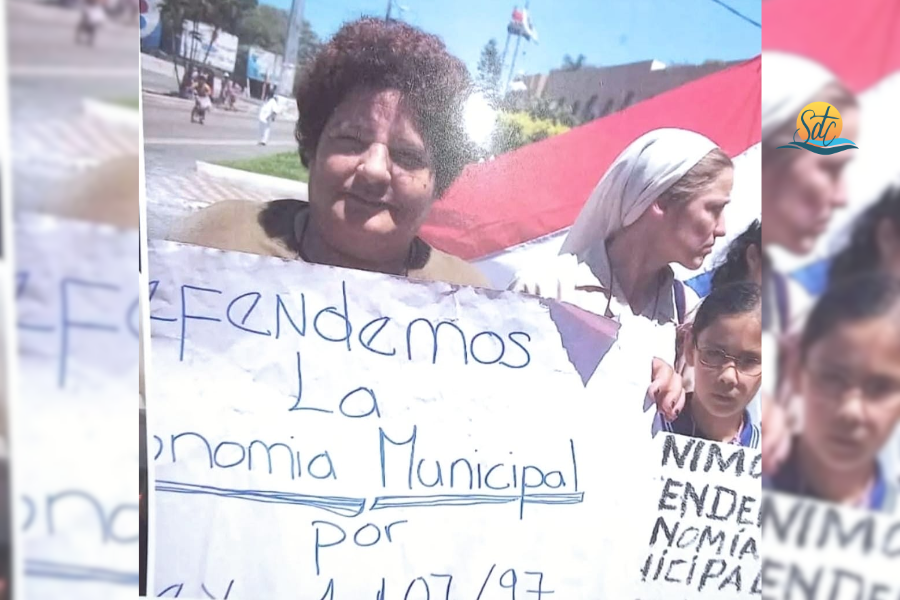October 15 marks International Rural Women’s Day, established by the United Nations General Assembly in 2007, to recognize their contributions, as they represent a quarter of the world’s population and provide half of the planet’s food sustenance while safeguarding the environment and biodiversity.
However, the situation in which they live limits their full potential and places them far behind urban women and men. Their work belongs to the informal economy with very little or no social and labor protection, so 64 percent have low incomes, less than 15 percent own their own land, 40 percent have no drinking water and are responsible for transporting the water consumed by the family; girls from poor rural families are more likely to marry before the age of 18 and give birth without medical accompaniment. Only 2% complete secondary education; most have no access to the Internet.
Everywhere you hear what the women workers in Paraguay are saying, “As women farmers, we have learned to cope with climate change, the land does not produce like it used to”, says Doña Nidia (from San Miguel), “we have to adapt and change”, for example by practicing sustainable agriculture, switching to the use of drought-resistant seeds or leading reforestation initiatives. recovery and awareness.
But “nothing compares to the tranquility of the countryside or the production of fresh, healthy food”, he adds. Doña Aurora (Km 4, Triunfo), who confirms and adds “It is a great effort to pursue the goal of improving the family economy, I do it with pleasure because I want my daughters to study”. Doña Nilda (Sgdo Corazón) completes, “Rural women workers are women of faith. We believe and support our people in the hope that something better is coming, that it is worth it, and that even when the harvest is not good, God takes care of us and feeds us”.
As Sisters of Charity, we try to promote their work as food providers and janitors of the environment, and accompany them so that they can participate in decision-making within their communities.
Some experiences:
In India, sister Pushpa says, groups of women have been organized to perform community tasks of cleaning, planting and tending the land, receiving a small subsidy from the government that allows them to improve their diets and access basic health care.
In Italy, at least in the Emilia Romagna area, women make up about 35 percent of those permanently engaged in agricultural activities. One in three establishments is run by women and is generally characterized by sustainability, capacity for innovation and direct sales of their products. Among those running these establishments, most are over 50 years old, indicating that young people are not encouraged to engage in these activities that are so important for food security, says Ms. Marina, of Ferrera.
Rural Albanian women work like men, undergo arranged marriages (they choose husbands for themselves), have children, take care of the large family, often live with her husband’s in-laws and brothers or sisters, hence the extended family. If she suffers violence (one out of every two suffers it), she does not fight back, keeps quiet and does not divorce (because she is immoral and would be despised even by her own family)… She has a key role to play in contributing to food security and poverty eradication. She does both household chores and work in the fields, from tending livestock, to carrying firewood on her back, to walking miles to more populated places to sell her products, she receives guests in the house, always head down without receiving compliments.
They may be young, but their sunburned skin, rough hands, poor education and fatigue from heavy work show a much older age. Much has been done, much must be done to restore their dignity, says Sister Marlysse.
Two experiences
My name is Porfiria Gauto and I live in Puerto Triunfo, Paraguay. I moved here when my children were young and I was coming back from a very serious illness. Our economy was not very good and a neighbor gave us a cow with her calf to take care of, milk and thus have milk for my children. With everyone’s effort, we came to have several milkmaids and went to sell milk. We also had our own garden with children who helped my husband support the family. A year ago we built a seedbed next to our house and embarked on a new challenge with my daughter Yessi, who is studying agricultural engineering. Now we have to sell vegetable seedlings and ornamental plants, such as cacti and succulents, and we prepare centerpieces and natural souvenirs for parties and event
The farmer is the first to get up, gives breakfast to the children, sees the animals. Then she accompanies her husband to the farm and returns to cook. In the afternoon she washes clothes, cleans the land, works and supervises everything until the children go to sleep. She is a worker, mother, wife, nurse, seamstress, cook, veterinarian, cleaner, educator, counselor, administrator, psychologist. She must be skilled in everything, capable of everything. (Ms. Adela Pereira, Cristo Rey, Paraguay)
Paraguay, Doña Nidia, San Miguel, cutting branches for planting.
Doña Aurora, 4 km from Triunfo.
Ña Nilda sgdo Corazón
Doña Adela
Porfiria


































